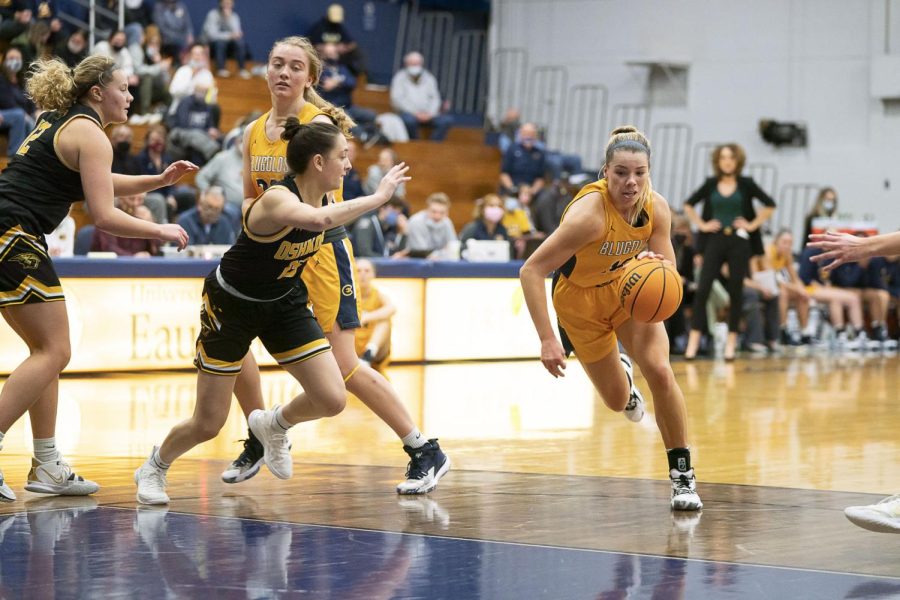Sophomore Alex Snyder is no slouch when it comes to handling an 85-pound, .50-caliber machine gun. After all, that’s his job.
But when it comes to his hobby, the infantry sergeant in the Wisconsin National Guard reaches for a significantly less deadly piece of equipment – a camera.
A photography hobbyist since high school, Snyder said he began taking pictures of his yearlong deployment in Iraq to help document his stay there. At first limited to just a small digital Kodak, Snyder eventually moved on to higher-quality equipment to capture images during the latter half of his trip.
“I just knew that I wanted to chronicle my year overseas,” the print journalism major from Rice Lake said. “It was going to be a pretty big deal.”
A land with some history
Iraq. The Fertile Crescent. Mesopotamia. Call it what you will – this war torn region used to be home to some of the world’s most ancient civilizations, and today is dotted with some impressive archaeological landmarks.
And Snyder can say he’s seen at least one of them. With his convoy pulled over for a break one afternoon near the ancient city of Ur – a place linked in the Bible to the life of Abraham – the photography enthusiast wasted little time in taking a few shots.
While he said he wasn’t able to visit the city itself, which he said was under excavation at the time, he did take a few shots of a nearby ziggurat temple.
Interestingly, Snyder said the occasion wasn’t as breathtaking as it may seem to others, despite the historic significance of the site.
“I mean, it was interesting,” he said, “but once you walked around it for a little bit, without knowing a lot of the historical background, it’s kind of hard to get really excited about it.”
Junior Brennan Kuhrt, a former high school classmate and a fellow soldier in Snyder’s unit, recounted his own encounter with a bit of the nation’s history. Kuhrt, an information systems student at UW-Eau Claire and a sergeant in the National Guard, said that during his deployment he visited a British monument erected to honor English soldiers who had died in Iraq during the early 1900s.
“It’s a really cool place. They’ve got this big monument set up for when the British were there,” Kuhrt said.
“It was kind of weird, ” he added, “because I was thinking, you know, just kind of how things go in cycles and how maybe one day somebody else will be standing in Iraq somewhere looking at a monument to when the Americans were there.”
Not quite Hollywood
Kuhrt said excursions to historical landmarks, however, were a rarity for the soldiers. Boredom, however, was not. In fact, that was something Snyder said was in vast supply.
“You have a Hollywood vision of what it’s going to be like and it’s not,” Snyder said. “It’s 90 percent boredom and 10 percent action.”
Both Snyder and Kuhrt said their jobs entailed providing security for convoys in Iraq, which Kuhrt said sometimes required riding through the Iraqi countryside for hours on end.
“As time goes on you just kind of – you realize that most of the time you’re basically just a trucker, you’re just driving down the road,” Kuhrt said. “That got really boring.
“You get to the point where you’re almost, like, hoping something happens just so you get a little excitement because you get so bored just driving and driving and driving,” he added. “It wasn’t uncommon when we’d go up north to be out on the road for like 14 hours at a time.”
Snyder said downtime was scarce for the soldiers, though he did say he and others usually tried to take advantage of any time off that was given – which was sometimes just a day or two sandwiched between weeklong missions.
“I think the longest I was out was 11 days straight,” Snyder recalled, “and you’d come back and sometimes you’d get a day off and you could do your laundry or whatever, but then there was other missions to run.”
To pass the time, Snyder said, soldiers often just picked up a newspaper or magazine. One group of soldiers even managed to hook up a pair of Xbox 360s in a tent, he said.
Or, as Kuhrt recalled, some would simply go out for a cup of coffee.
Those simple pastimes were something Snyder said he tried to capture in pictures of one of the bases his unit stayed at. The scene of a soldier, identified only as Sgt. Riley, reading a newspaper to pass the time, he said, was too good a shot to pass up.
“We were just chilling out for a few hours before we made a push out,” he said.
“It just kind of showed what we do in our downtime when we’re actually on the road,” he said. “It’s nice to read the paper, buy a magazine or something. Real simple stuff, you know.”
Snyder, who may soon head to Iraq for a second tour of duty, acknowledges the boredom of base life and the danger of war, but he said his overall experience the first time around was positive.
“I think I’m a better person for having gone through all that. It’s definitely made me who I am,” he said. “I wouldn’t say it defines me, but it has been a pretty good experience.”
And as for those pictures? Snyder said it’s very likely that they’ll find an audience someday.
“I knew I wanted to show my kids someday what I did for a year and what I’ll be doing again,” he said.
“If they ask me about it, I’ll tell them what we did. I grew up with my dad’s army stories. I’m sure (my children) will grow up with mine.”





